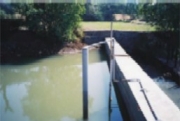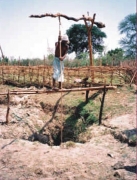/sub-categories/research-papers
Research Papers
Water challenges in Greater Bangalore - NIAS-CASUMM workshop note (2007)
Posted on 01 Aug, 2010 03:36 PMThis document provides the background for a workshop on 'Water Challenges in Greater Bangalore', organised by NIAS and CASSUM at the National Institute of Advanced Studies (NIAS), Indian Institute of Science (IISC) campus on March 27, 2007.
The document highlights the current scenario of privatisation of water services that are being funded by international financial institutions under the water sector reforms in the city of Bangalore, which have had a very negative impact on the urban poor, who continue to face the problem of inadequate, unreliable and unsafe water supply as compared to other posh and water rich areas in the city.
The encroaching Ganga and social conflicts: The case of West Bengal
Posted on 01 Aug, 2010 01:39 AMThis report deals with the social conflicts emerging out of the encroachments owing to the change in course of the Ganga upstream and downstream of the Farakka barrage. The barrage was built with the intention of diverting water into the Hugli river with a view to flush the sediment load into the deeper part of the estuary and revive the navigational status of Kolkata port. During the last three decades of its operation, the silt-management in the barrage was given scant or no attention. The sediment movement in the tidal estuary of Hugli is a function of a complex fluvial system that can hardly be governed by inducing 40000 cusec of water.
Private investment in groundwater irrigation: Do the public institutions matter? - The case of West Bengal
Posted on 01 Aug, 2010 01:34 AMThis paper by Centre for Studies in Social Sciences and Jadavpur University, aims at explaining the factors that determine private investment in groundwater irrigation in West Bengal. It also addresses the issues pertaining to institutional arrangements, particularly provision of facilities by the government. The study, largely empirical in nature, is based on data collected from surveys conducted in close to one thousand moujas (villages) spread across the major agro-climatic zones in West Bengal. It begins with a descriptive account of the changes in the agricultural scenario in West Bengal over the last thirty years. The research questions are discussed and the econometric methodology presented.
Research outputs from National Institute of Hydrology for 1996 to 2001
Posted on 24 Jul, 2010 09:25 PMThe research outputs from National Institute of Hydrology have been divided according to the year of creation below. You can also view an excel spreadsheet
Relevance of Meltwater in River Basin Hydrology
Posted on 23 Jul, 2010 10:53 PMA peer paper in Science Magazine focuses on the core of a riverine system, the upstream basin, and its impact on the entire river basin.
Augmenting groundwater resources by artificial recharge: A case study - Kolwan valley - A report by ACWADAM
Posted on 19 Jul, 2010 04:45 PM This report by ACWADAM describes the results of a research study conducted under the DFID funded AGRAR project at the Kolwan site in Pune district of Maharashtra state in India. The research focused on studying the usefulness of artificial recharge to augment groundwater resources through watershed development.
This report by ACWADAM describes the results of a research study conducted under the DFID funded AGRAR project at the Kolwan site in Pune district of Maharashtra state in India. The research focused on studying the usefulness of artificial recharge to augment groundwater resources through watershed development.
An important criterion of the study was also to understand the impact of artificial recharge on already changing livelihoods in areas where watershed development was conducted on a large scale.
A rapid geohydrological study of microwatersheds from Bolangir district, Orissa state - A report by ACWADAM
Posted on 16 Jul, 2010 03:50 PM This document by ACWADAM is a report of a rapid geohydrological assessment of some of the microwatersheds from parts of Bolangir district Orissa.
This document by ACWADAM is a report of a rapid geohydrological assessment of some of the microwatersheds from parts of Bolangir district Orissa.
Bolangir district in Orissa forms a part of one of the hottest and backward regions of India with low land-productivity, and opportunities and technologies for agriculture in the district remain relatively unexplored.
Vagaries of rainfall and the underlying hard-rock geology further compound the problem and limit agricultural productivity to a great extent. Given such natural uncertainties, systematic implementation of a watershed management programme is the most viable avenue to overcome the problems of this region.
Bolangir district was thus selected as pilot area to conduct a pre-feasibility exercise for planning of water resources management. ACWADAM, Pune was invited, along with Samaj Pragati Sahayog, Bagli to conduct this pre-feasibility exercise.
Draft regulatory framework for wetlands conservation - Comments by ATREE
Posted on 09 Jul, 2010 11:49 PMThe Ministry of Environment and Forests released a draft of the regulatory framework for wetland conservation - Wetlands Conservation and Management Rules (2009) for feedback from all stakeholders. The draft framework was prepared by a multi-disciplinary expert group, and final round of comments were invited till June 21st 2010.
The Wetland Conservation Team of Ashoka Trust for Research in Ecology and the Environment (ATREE) did a detailed analysis of the draft regulation and submitted several pertinent concerns to the Ministry. The most significant observation is that the new framework (as do much of India's policies and laws) continues to propose unjustifiable State control and interventions over the country's wetlands and livelihoods of people dependent on them. The regulation does not make any constructive suggestions or recommendations for the conservation that the country's wetlands demand, and instead brings all wetlands into complete official control by installing Central, State and District-level wetland regulatory authorities, wherein the majority of the members will be senior government officials.
Conservation of lakes - Myths and realities of desilting
Posted on 09 Jul, 2010 11:11 PMDesilting is becoming a major component of any Lake Conservation Project now a days. The basic reasons given for necessity of desilting are - increasing the storage capacity and checking eutrophic conditions.
As it is not practicable to reverse the slow process of silting in the bed of lakes through which only silt can be removed, there is no word like 'desilting' in any standard English dictionary. What we are doing in the name of 'desilting' is practically 'digging' or 'excavation' of lake bed. By so called desilting, the original lake bed is disturbed which has far reaching adverse effects on the performance of the lake. Most visible effect is the increase in percolation rate resulting in heavy seepage losses through the lake bed as observed after massive desilting at Pushkar lake in 2009.
Optimal operation of groundwater skimming wells A study of 90 wells along the river Yamuna at Palla,North Delhi
Posted on 02 Jul, 2010 04:49 PMAbstract